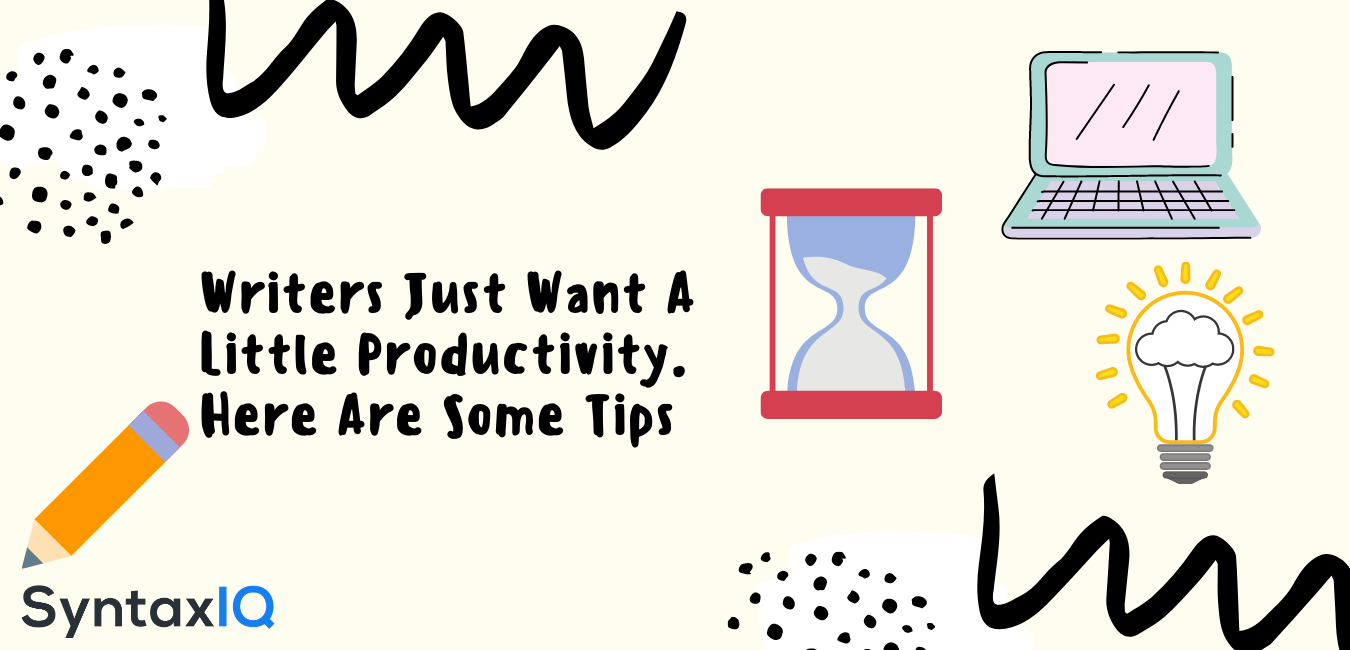Productivity Tips for Writers
By Paul Wynter April 3rd, 2020So, you know you’re writer and you’re good at it, but you want to take a look at your overall productivity. You aren’t alone. In fact, writers — along with the other people in the arts — and completely familiar with the idea of fact that time spent on writing is not always productive time spent on writing. If you are looking to boost that productivity without getting up everything else in your life, you’ve come to the right place. Here you’ll find real, writer-tested and constructive productivity tips designed for writers of all kinds. Ready? Here we go.
• Create a routine: If you are someone who doesn’t normally have a routine or schedule to their days, this may scare you. Relax, it doesn’t have to be a 10 step itemized plan for each day. Just design a routine that you can keep up 5 or 7 days a week in which you carve a segment of time for writing. For the best results, you’ll want to try to choose the same time every single day so that you sit down in front of the computer (or notebook and pen), feeling inspired.
• Have a plan (outline): It’s hard to be productive when you don’t really know what you are supposed to be working on. It can also be overwhelming because you have to spend time sorting out what you should be doing instead of writing. So, before you enter your scheduled time, make sure you have a plan/outline to help guide your time. IT could just be a few bullet points that you want to cover in the chapter you’re writing, or maybe it’s a full content brief to the article you’re writing. Whatever it is, have it there in front of you and be familiar with what it says before you start write. Having that structure will really help you focus.
• Work at the right time for you: There are certain people who are morning people and feel the most productive in the early hours. Then there are other people who like to work in the late morning or early afternoon. Then, there are the night hawks who really make the most out of those midnight hours. It doesn’t matter which one of these you are, just pick the right hours for you and work during them. You’ll get more done in those hours than you will trying to force yourself to work at a time in which you aren’t motivated to. Not sure which hours work best? Try writing a few different times and use that to help guide you to success.
• Set realistic writer-based goals and keep track of your progress: You’ll also want to set some goals on a daily basis that are going to be accessible. For most writers, it’s a word count goal. They have to write, for example, 2,000 words by the time they finish for the day. The goal should be accurate and do-able for the writer. It’s okay if you under- or over-estimate at first. Just learn what’s a decent amount for you. No matter how under or over you are, track your progress daily and see it in real-time right in front of you.
• Consider an accountability buddy: If you want to make sure that you are hitting your goals but don’t trust yourself to stay on-task, have an accountability buddy. This buddy would know your goals per day and you will need to report in with your actual word count of the day. They won’t be responsible for praising or scolding you, they’re just someone who you know is going to be there waiting for a report. Sometimes it can motivate you write even if you can’t for yourself.
• Design a writer space: Having a designated space for writing is important. It shouldn’t be your bed or your couch or anywhere where you’re prone to relaxing or falling asleep. Ideally, it’s in a home office or a den or even a corner of your living room. Wherever you choose, it should be a set space that you just use to write and that’s it. It’ll help you stay focused on your task.
• Turn off your inner editor: When you sit down to write, write. Don’t edit. Those editing times are coming ,but you can’t edit something if you’re still writing it! Just ignore the grammar and typos and write until you’re done. Then you can go back and edit the entire piece during the following week instead of writing.
• Use the power of white noise: White noise does a lot and it can make a huge difference to getting distracted. There are all sorts of playlists online and apps that you can use to filter white noise through headphones so that it’s a pleasant background noise that blocks out any conversation or other distractions that threaten your writing time. It often makes you more productive, too.
• Stay positive about your progress no matter what: This is a productivity tip that most writers ignore, but it’s important. You have to stay positive about your work even on those bad days where every word is a struggle and every chapter is ripe with cliches and plot holes. It’s part of the process and it doesn’t matter. You are creating and that is a wonderful thing. Stay positive about any amount of progress you make. If you don’t, your productivity will just dip down to zero and it’ll be hard to re-invigorate it later.
It’s common to finish reading and think to yourself “they’re so simple!”; And that’s precisely the point. These tips are designed to be simple and accessible by any and all writers so that they can put them to use in their own lives with as few changes needed as possible. Whether you take all of these or some of these to heart and try them out, you’ll find a noticeable difference in your productivity levels. Now all that remains is deciding whether or not you can make that stick or not on a day to day basis!
Share:
Create Your Free Account
Have questions? Contact Us at [email protected]





